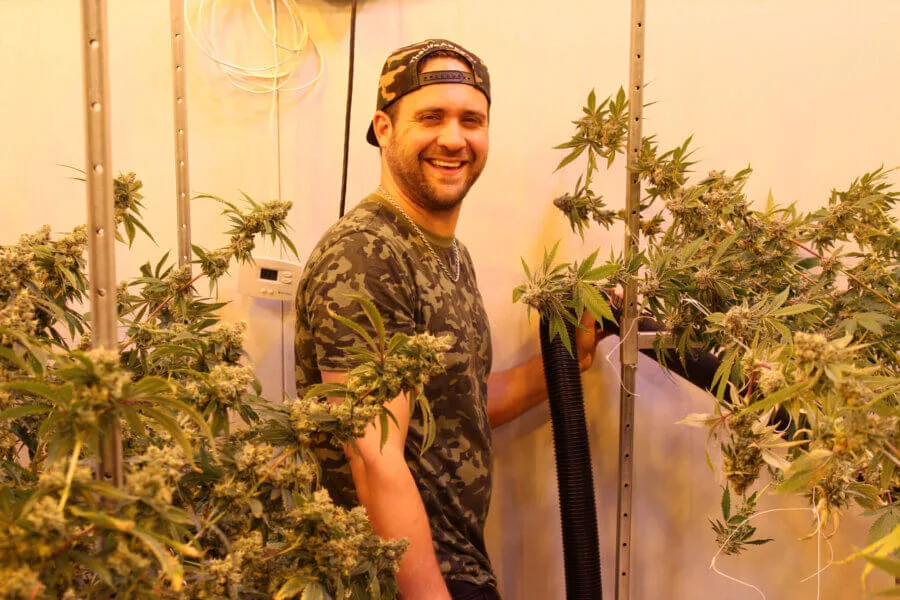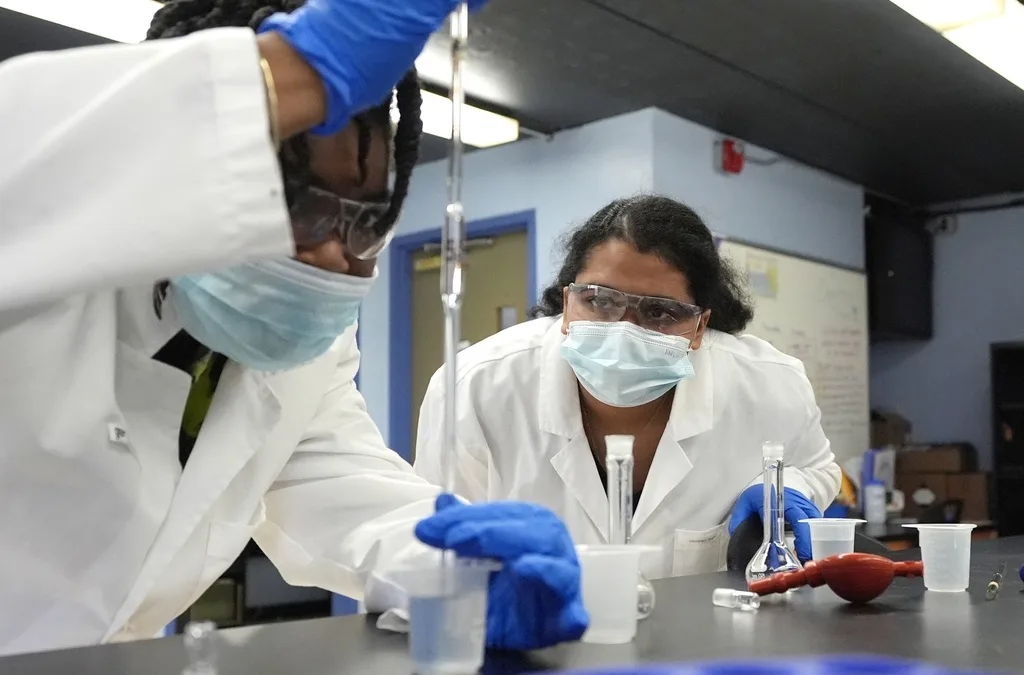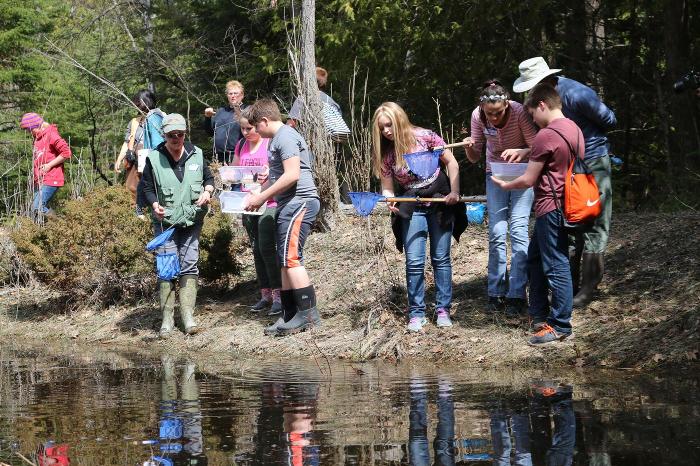
Rich Ainsworth tends to marijuana plants at Old School Organics in Lapeer. (Courtesy/Old School Organics)
This story was featured in our MichiGanja Report, a free monthly newsletter from The ‘Gander about all things cannabis, written by political correspondent Kyle Kaminski. Sign up here to get the next edition sent straight to your inbox.
Think of it like the weed your grandpa used to grow, if your grandpa was an award-winning caregiver with decades of experience.
MICHIGAN—Jason Allen, the co-founder of Old School Organics in Lapeer, likes to compare weed to wine.
Any Michigander in need of a cheap buzz can easily stroll into a gas station convenience store and pick up a bottom-shelf bottle (or box) of wine for less than $10. You won’t be proud to pour a glass for your next date night, and it won’t be coming along to dinner with the in-laws. But it gets the job done—and if you’ve never had anything better, you probably won’t have a complaint.
So goes the Michigan weed market.
With more than 600 pot shops now licensed across Michigan and average statewide prices plummeting to less than $3 a gram this month, there’s plenty of cheap bud on dispensary shelves nowadays. It may be dry. It may give you a headache. But lots of shops are stocked with $2 joints and $70 ounces that’ll keep your wallet happy—just like boxed wine.
And just like wine aficionados, stoners looking to actually enjoy their cannabis experience will probably have to shell out a few extra bucks for those fuller-bodied, earthier, fruitier, flavor profiles—and potent highs—that only veteran marijuana growers know how to produce.
At Old School Organics, it’s the unofficial mission statement: You get what you pay for.
“There’s always going to be different classes of products out there,” Jason Allen told The ‘Gander. “You can get a $12 bottle of wine, or you can get a $12,000 bottle of wine. There are always going to be products made for connoisseurs.
“The point is there’s a real craft—almost an art form—when it comes to producing products like these. These are high-quality products that only really come from experience. This is for the connoisseurs.”

Before 2008, Allen hadn’t harvested much more than a small vegetable garden. But following a car crash and a prescription for medical marijuana, he began getting acquainted with caregivers—legal growers for the medical marijuana industry—and decided to make cannabis a career. He launched his first indoor grow operation in the middle of the Manistee National Forest.
For the next decade, Allen sought out tips and tricks from some of the state’s more experienced, old school pot growers, collecting some of the most iconic (and mind-numbing) strains on the market along the way, including this writer’s personal all-time favorite, OG Kush.
“I just had an obsession with high quality cannabis,” he said. “I realized there was this other caliber of pot that I didn’t even know existed—like it was from another planet. From then on out, I was on the hunt for quality.”
After Michigan voters approved recreational marijuana sales in 2018, Allen saw a chance to differentiate his operation from the thousands of other pot farmers across the state: This bud is grown the old school way.
Like the name implies, Old School Organics only cultivates organic weed—meaning it’s all bud grown in real soil instead of various (cheaper) artificial substrates. Each of the 2,000 plants blooming in the Lapeer facility are also hand watered—and they aren’t pumped full of chemicals commonly used in larger scale cultivation operations. Think of it like the weed your grandpa used to grow, if your grandpa was an award-winning caregiver with decades of experience.

“With wine, there are certain grapes that can only be grown in certain conditions,” Allen said. “There are all these different factors that go into these distinct wines—and the same things happen with cannabis. You’ll never find another organic grower with products that taste just like mine, because they’re all using slightly different inputs and feeds, and different techniques. You can’t treat every plant the same. These are things you can only really learn from experience.”
Different marijuana strains need varying levels of nutrients and light to thrive, Allen said. For example, plants that are positioned directly below a light source will need a different amount of water compared to those on the edge of the crop. It takes an experienced eye to know the details.
“I can water and feed each plant exactly what it needs based on its visual appearance,” Allen said. “It helps us figure out an exact schedule for each plant, and adapt. These are things that you can only tell by actually seeing and interacting with a plant—not with a computer system.”
According to Allen, spending the extra time (and money) to produce a superior product is worth the extra effort. Newbie smokers, he said, might be tricked into thinking all weed is the same, but at Old School Organics, you can taste the difference. His products have a richer flavor profile, a smoother smoke and perhaps most importantly, a higher concentration of terpenes. And with an average price of $35-40 for a 3.5 gram bag, it’s still one of the more reasonably priced top-tier products on the shelves in Michigan.
“If you ever notice that cheap weed tastes the same, it’s probably because it’s all grown with the same mass-produced chemicals and the same standardized system,” Allen said. “That’s great for efficiency and mass production, but it always sacrifices the potential quality of the product.”

For the uninitiated, terpenes are the naturally occurring chemical compounds in cannabis that work alongside THC to produce a high—and different combinations are reportedly responsible for the slightly different effects of any given marijuana strain. Some terpene profiles tend to have more energetic effects than others, for instance. It often depends on the individual consumer.
It’s relatively rare to find cannabis in Michigan with a terpene concentration of more than 2%. Allen said his weed routinely surpasses 3%. One of his latest harvests tested in at 4.2%. Translation: If you’re accustomed to smoking a whole joint of cheaper bud after work, maybe start with just a few hits of Old School Organics’ products. A little tends to go a long way.
Old School Organics harvests about 75 lbs. of marijuana from its Lapeer facility every three weeks—and Allen said he expects to double that output by the summer.
Look for Old School Organics’ products in about 100 dispensaries across the Lower Peninsula—including retailers like Great Lakes Holistics, Local Roots, Ascend Cannabis and Light’N Up.

This article originally appeared in The MichiGanja Report, a free monthly newsletter from The ‘Gander about all things cannabis, written by political correspondent Kyle Kaminski. Click here to subscribe, and we’ll send the next edition straight to your inbox.
Politics

Biden administration bans noncompete clauses for workers
The Federal Trade Commission (FTC) voted on Tuesday to ban noncompete agreements—those pesky clauses that employers often force their workers to...

Remember Betsy? Michigan education leaders blast Trump for ‘abandoning’ public schools
Michigan lawmakers and teachers are rallying behind President Joe Biden—and reflecting on a rough period for public schools after Trump put Betsy...

Michigan Dems announce bills banning PFAS in household products
BY SUSAN J. DEMAS, MICHIGAN ADVANCE MICHIGAN—Two Democratic House members on Monday announced they are sponsoring legislation that would eventually...
Local News

Children of Flint water crisis make change as young environmental and health activists
FLINT—Their childhood memories are still vivid: warnings against drinking or cooking with tap water, enduring long lines for cases of water, washing...

These students are protecting the ‘coral reefs’ of Michigan—and you can too
Vernal pools are a critical part of Michigan’s natural ecosystem—but they’re not protected by state regulations. Here’s how Michiganders are...






